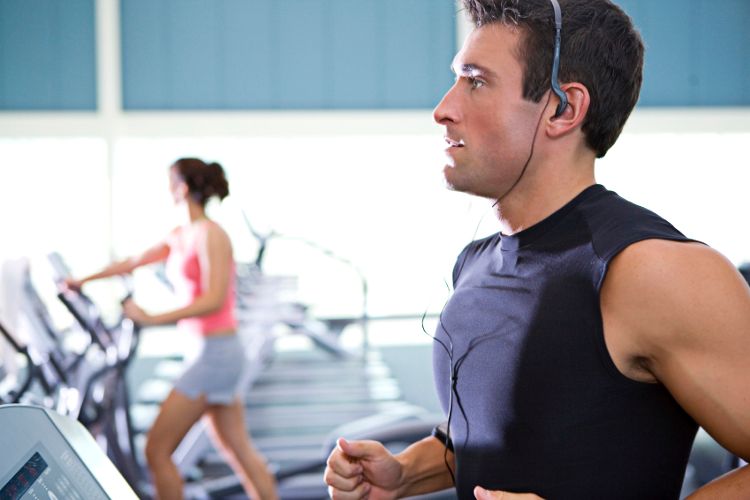Recent study finds that proprietary blackcurrant extract exerts hypotensive benefits post-exercise
The study found that the blackcurrant extract may increase the heart health benefits of exercise.
Photo © iStockphoto.com

A recent study1 found that supplementation with an extract of New Zealand blackcurrant (CurraNZ from Health Currancy Ltd.) increased postexercise hypotension in young, physically active men and women following sustained moderate-intensity exercise. In the double-blind placebo-controlled, randomized cross-over design study, 15 subjects took either the extract or placebo for seven days then completed a one-hour treadmill exercise at 50% maximal oxygen uptake, followed by a two-hour supine rest with blood pressure and heart rate variability measurement.
Results showed that subjects taking the blackcurrant extract saw an increase in average fat oxidation and larger high-frequency relative power during exercise. During the rest period, subjects taking the extract saw a greater delta change in systolic blood pressure compared to placebo, with no difference in diastolic blood pressure and mean arterial pressure. According to the researchers, the decrease in systolic blood pressure of 5.6 mmHg in subjects taking the blackcurrant extract is clinically relevant because a reduction of 3 mmHg in systolic blood pressure is associated with a 5% reduction in mortality from cardiovascular disease.
“This study has shown that short-term intake of blackcurrant extract effectively increases the hypotensive benefits of exercise, which is an exciting discovery and novel finding,” explains Matthew Cook, PhD, senior lecturer in Sports and Exercise Science at the University of Worcester, and leader of the project, in a press release from Health Currancy. “Exercise is a well-known way of managing high blood pressure, because of its effects on reducing resting values. We know that elevated blood pressure is a modifiable risk factor for various diseases, and even small changes in blood pressure can have large implications for health across the lifespan. Post exercise hypotension is a good thing and one of the main benefits of undertaking exercise.”
Cook also expressed interest in repeating the study in hypertensive adults, saying that they “would likely be more sensitive and may demonstrate an even larger post-exercise response.”
In addition to the hypotensive response, the improved fat burning during exercise may offer performance benefits to athletes. “Fat metabolism during exercise is an important factor for endurance performance and increasing the body’s ability to use fat during exercise, could be beneficial to performance during events where the bodily stores of carbohydrate are important,” explains Cook.
The press release also quotes Kenna Stephenson, MD. A clinical professor at the University of Arizona College of Medicine, and advisor to CurraNZ, Stephenson says she prescribes the extract to her patients and uses the product herself.
“Many of my patients are challenged in finding access to fresh berries as part of a healthy diet, and CurraNZ is a perfect solution. This dietary supplement boosts anthocyanins which help the body in stress recovery and has favorable effects on the cardiovascular system and overall metabolism,” says Stephenson. “This latest finding, that it can help lower blood pressure, is exciting to me as a Family Medicine Physician. CurraNZ has proven potency and is supported by multiple evidence-based research studies. I confidently prescribe this supplement to my patients seeking their greatest potential in aging well and enhancing benefits from physical activity.”
According to the company’s press release, CurraNZ has been featured in over 50 peer-reviewed papers investigating the ingredient’s health benefits. This current study is the seventh cardiovascular investigation and the 12th to investigate energy metabolism.
Reference
Shan, Y.; Cook, D. New Zealand Blackcurrant Increases Postexercise HypotensionFollowing Sustained Moderate-Intensity Exercise. International Journal of Sport Nutrition and Exercise Metabolism. 2023. Article ASAP, DOI: 10.1123/ijsnem.2023-0014 (Accessed 2023-8-8)
Rousselot to showcase new collagen peptide research and targeted solutions at Vitafoods Europe 2024
April 25th 2024The company will be highlighting new research that demonstrates the ability of its Peptan collagen peptide brand to support sleep quality, reduce gastrointestinal discomfort, and enhance skin health, including density, hydration, and elasticity.
Judge denies CRN’s motion for preliminary injunction but its lawsuit against NY state will proceed
April 23rd 2024The judge in CRN's lawsuit against NY state's law banning the sale of weight management and muscle building supplements to minors has denied its motion for a preliminary injunction, but determined that CRN has standing to sue on behalf of its members.
Arla Foods to acquired whey nutrition business from Volac International
April 22nd 2024Arla Foods Ingredients has reached an agreement to acquire Volac’s Whey Nutrition business through a purchase of shares in Volac Whey Nutrition Holdings Limited and its subsidiary, Volac Whey Nutrition Limited and Volac Renewable Energy Limited.